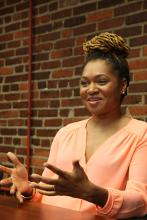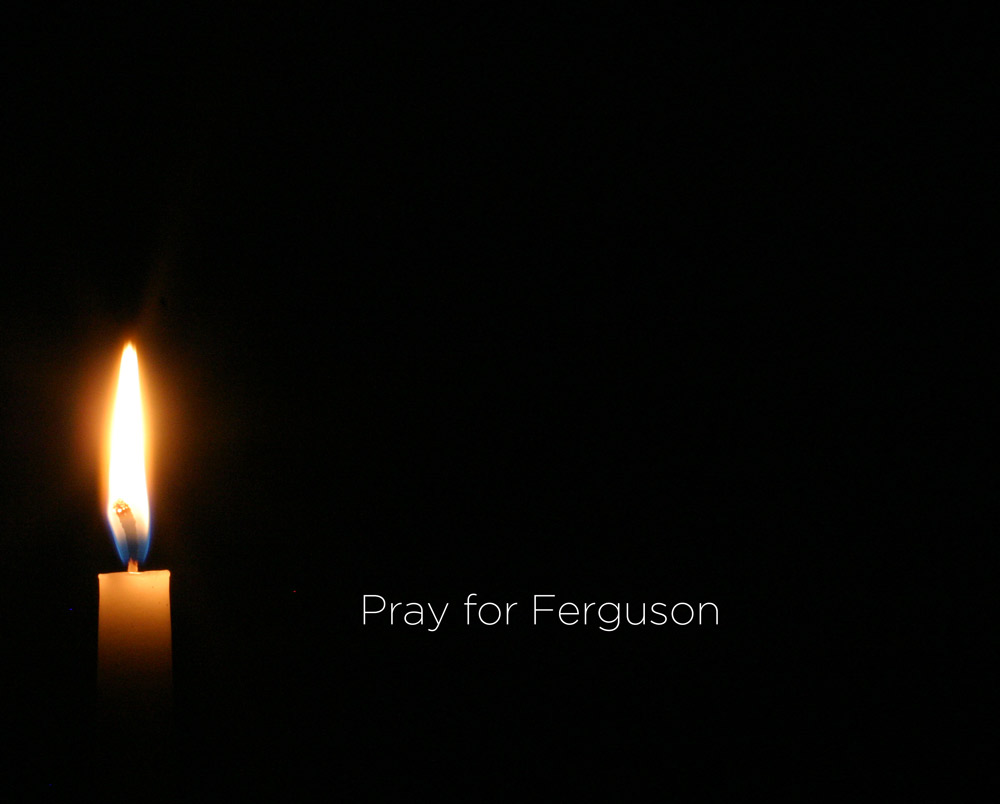black lives matter

It can be dangerous to be black. In 2012, a black person was killed every 28 hours by law enforcement officials or self-styled "vigilantes." About 27 percent of African-Americans live below the poverty line. Black families are seven times more likely to be homeless than white families. African-Americans are four times more likely to be murdered than the national average.
It's not about semantics. It's about systems (and minds) that need to be changed for the betterment of the future. And that future will, in fact, be better for all lives.
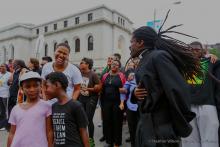
PHOTO ESSAY: On Monday, fifty-seven people were arrested as part of the #UnitedWeFight march and peaceful civil disobedience at the Thomas F. Eagleton U.S. Courthouse. The march was in commemoration of the year-long resistance sparked in #Ferguson by the murder of #MikeBrown.
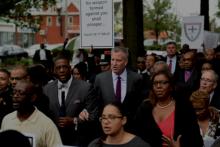
And here suddenly the letter lurches forward in time, slides through decades and lands squarely in our laps in 2015. It seems almost as if he isn’t talking about men and women of the past, but about Michael Brown, Eric Garner, Clementa Pinckney, Sharon Coleman-Singleton … the list is so sickeningly long.
He goes on to record injustices in Birmingham: “There can be no gainsaying of the fact that racial injustice engulfs this community. Its ugly record of police brutality is known in every section of this country. Its unjust treatment of Negros in the courts is a notorious reality. There have been more unsolved bombings of Negro homes and churches than in any other city in this nation.”
Wait. What are we talking about? Birmingham, or Cleveland? Ferguson? Charleston?
“Letter from a Birmingham Jail” has always itched at me, unsettled me. It bothers me because King isn’t writing to political leaders, but religious leaders, people of faith, people who follow the same Jesus as me.
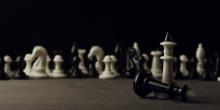
Over the past year, #blacklivesmatter has taught me that the work of theology is not limited to the hallowed halls of academic institutions or sermonic reflections from prestigious pulpits on Sunday mornings. At community meetings and rallies, I learned new hymns in the form of movement chants. I learned that protest can be a form of prayer. #Blacklivesmatter is more than a hashtag. It is a call for repentance. It is an invitation into a state of prophetic grief and collective lament that does not anesthetize us from our pain but allows us to reconnect to the depths of our humanity by feeling, together, the torment our silence on issues of racial injustice has sown. It is only together that we will be able to actualize the transformation God is calling us to effect in this world.

EVEN AS SOUTHERN states—and GOP candidates—jumped through hoops to distance themselves from the Confederate flag, a backlash erupted among those claiming the flag was merely a symbol of “heritage.” Battle-flag waving Southerners (and Confederacy sympathizers) seemed to leap at the opportunity to wave their banner high.
But what about the rest of us? One of the most profound statements I’ve heard recently came from Rev. Jin Kim, founding pastor of Church of All Nations in Minnesota. This Korean-born pastor stood at the podium of the Sojourners Summit and said with conviction: “I am a white supremacist.”
How can this man, a person of color who’s dedicated his life to ethnic and cultural reconciliation, be a white supremacist? The same way any of us can. After all, at its heart white supremacy is not about white hoods, battle flags, and burning crosses. Those symbols are what we call explicit bias. People know when they are practicing it.
But most often white supremacy is about implicit bias that favors whiteness. It’s about the unconscious associations we make in our minds before we even know we’ve done it. White? Rich. Black? Poor. White? Good. Black? Bad. White? Trustworthy. Black? Scary. You get the idea.
These are the unconscious biases that shape the way we order our lives; the communities we live in, the places we shop, the churches we attend, the leadership from others we accept (or reject), and the policies we support (or don’t).
It’s not hard to fume at the thought of the killer of Mother Emanuel’s Nine. And it feels good to click “like” and share posts calling for the removal of Confederate flags.
But if we stop there, bias beats us. It is the unconscious biases of the masses that keep us from moving forward, not the explicit biases of the few. So, check out this tongue-in-cheek list of four easy ways to be a white supremacist (regardless of your own race).
1. Plan a conference on church planting with a speaker lineup so white it would make Honey Boo Boo blush. And if you want to increase your “diversity,” have one speaker of color (even if he is from India), an Asian emcee, and maybe a black worship leader.
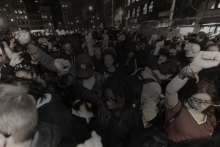
AUG. 9, 2014, is a day I’ll never forget. It was the day that Michael Brown was killed by Ferguson, Mo. police officer Darren Wilson.
For many young people in the United States, especially those of us involved in the Black Lives Matter movement, this was our Sept. 11. We all remember exactly where we were and what we were doing when the news broke of another police-involved killing of an unarmed black citizen.
I was in the final days of a yearlong internship with Sojourners. My fellow interns and I were on our closing retreat in West Virginia. I was on my phone checking my Twitter timeline when I began to see retweets of images: Michael Brown laid out on Canfield Drive with blood still leaking from his bullet wounds. I remember the anger that instantly came over me. “Not another one!” was all I could think.
As the day wore on, I felt frustrated that I was stuck in a retreat house, forced to sit idly by while the grieving community in Ferguson was antagonized by officers in riot gear with police dogs. I knew then that I had to do whatever it would take to join the people in this fight for justice. I never imagined how this movement would change the way I—and many others—actually do theology.
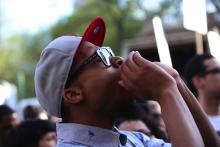
A "crisis management" report shows that a Baltimore cybersecurity startup, ZeroFox, singled out members of the Black Lives Matter movement as "threat actors" during the protests and rioting around Freddie Gray's death in April, Mother Jones reports. The report highlights two Black Lives Matter organizers, DeRay McKesson and Johnetta Elzie, terming their threat level "high" and "physical," urging "continuous monitoring." It also identifies Baltimore officials and law enforcement agencies for "asset protection."
This follows on reports in late July that the Department of Homeland Security has been comprehensively monitoring Black Lives Matter activities in Ferguson, Mo., Baltimore, Md., Washington, D.C., and New York, N.Y since August 2014.
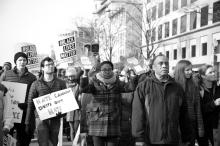
In the wake of Sandra Bland’s death, I’ve seen comments from other white Christians on social media defending the arresting officer, denying that Sandra Bland was mistreated, blaming her for what happened, and denying that race had anything to do with what happened to her. Their responses were so knee-jerk automatic that I probably could have written them ahead of time before learning anything specific about the events in question. We humans can be quite tribal, and we instinctively tend to identify with the people who are most like us.
Many whites balk at the suggestion that their views and assumptions might be racist because they know themselves to be moral people who live decent lives and maybe even have some black friends. They certainly don’t hate anybody, and they aren’t supporters of the Ku Klux Klan. Because they understand racism on an individual rather than systemic level, it seems impossible to hold together an image of oneself that contains both “good person” and “racist.”
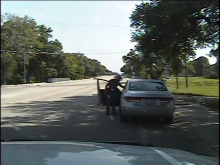
Once again we find white people blaming a black victim of violence. She’s to blame because she was “irritated.” She’s to blame because she refused to put out her cigarette. She’s to blame because she’s black.
A white response that blames Sandra Bland is a racist response. White people can get away with being irritated at police. We don’t have to be kind to officers. We can express our anger and not fear arrest.
A black person though? If a black person shows any anger, they will likely be arrested or possibly killed. And it will be construed as their fault.

The purpose of spiritual disciplines is not to earn brownie points but to restore or renew relationships. God seems most concerned to restore relationships that are most broken in society. This means that the outcry for justice from the Black Lives Matter movement provides an opportunity for the renewal of the church. The “Spiritual Practices for Confronting Racial Bias” presented by copastors Rebecca Steele and Larry Watson were these: gather in small groups that are 1) half black and half white, 2) half poor and half not poor, and 3) have a small stewardship team that redistributes tithes and offerings to those in need.
Those are indeed spiritual disciplines. And they were like the spiritual disciplines of the early church whose members not only brought tithes and offerings but they also sold possessions and brought the proceeds for redistribution among those who had financial needs (Acts 2:45). This same church, when one group (Gentiles) complained about discrimination in widows’ support, gave all the distributive power to the discriminated against (Acts 6:1-5).
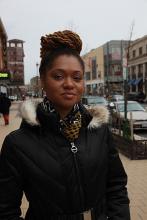
Bio: Erika Totten is a leader in the Black Lives Matter movement in Washington, D.C., and the black liberation movement at large. She is a former high school English literature teacher, a wife, a stay-at-home mom, and an advocate for the radical healing and self-care of black people through “emotional emancipation circles.”
1. How did you get started with “emotional emancipation” work?
Emotional emancipation circles were created in partnership with The Association of Black Psychologists and the Community Healing Network. I was blessed to be one of the first people trained in D.C. I had been doing this work before I knew what it was called. My organization is called “Unchained.” It is liberation work—psychologically, mentally, spiritually, and emotionally.
I want to tell people to be intentional about self-care. Recently, we had a black trans teen, who was an activist, commit suicide. A lot of times you need to see a counselor or therapist, which is often shunned in the black community. Because of racism, we are taught that we need to be “strong.” But it’s costing us our lives. As much as we are dismantling systems, we have to dismantle anything within ourselves that is keeping us from experiencing liberation right now.


We don’t know what prompted Rev. Franklin Graham to log onto Facebook and pound out the words that lit a firestorm last week. But within one day, tens of thousands of his faithful followers liked and shared his short, patronizing post that called “Blacks, Whites, Latinos, and everybody else” to “Listen up” and tune in to his take on why so many black people have died at the hands of police officers recently. According to Graham, the problem is “simple.” It can be reduced to their lack of obedience and bad parenting.
By Monday morning, more than 80,000 people shared the post and almost 200,000 liked it. Sojourners’ Jim Wallis penned a strong response.
On Friday an evangelical pastor based in Oakland, Calif. (the birthplace of the Black Lives Matter movement), Dominique Gilliard, shared the post with a small diverse group of evangelical leaders who decided to craft a collective response. This open letter was crafted by the collective efforts of Rev. Leroy Barber (CCDA and Word Made Flesh), Gilliard (New Hope Oakland), Dr. Brian Bantum (Seattle Pacific University), Micky ScottBey Jones (Transform Network), Efrem Smith (World Impact) and me (Sojourners). We didn’t know if our words would resonate. We only knew the truth that we must speak in response to Graham’s outsized influence coupled with apparent ignorance. In the end, a broad representation of national evangelical leaders agreed to sign this letter to Graham as principal signatories.
We invite you to read it, discuss it in your churches, and add your name to the many who say “No more!” We will not tolerate this type of flippant, patronizing commentary from faith leaders on critical issues that mean life and death for many in the body of Christ and in communities across America. We won’t tolerate it, even one more day. Rather, we invite all with open hearts to enter into dialogue — and to join us in the ministry of the gospel — the ministry of reconciliation.
1. Because Extreme Cold Always Brings Climate Deniers Out of the Woodwork …
Bill Nye, yep, the Science Guy, offers the media this helpful prompting: “‘Let’s not confuse or interchange climate change with global warming,’ noting that when the climate changes, ‘some places get colder.’”
2. After the Copenhagen Synagogue Shooting, This Muslim Community Is Responding in the Best Way Possible
“Islam is about protecting our brothers and sisters, regardless of which religion they belong to. Islam is about rising above hate and never sinking to the same level as the haters. Islam is about defending each other. Muslims want to show that we deeply deplore all types of hatred of Jews, and that we are there to support them.”
3. Afghan Civilian Deaths Hit Record High
2014 was the deadliest year on record for civilians in Afghanistan, according to the U.N. Total civilian casualties jumped 22 percent from 2013.
4. Ash Wednesday: To Be Seen
“… revelation does happen and ... we see. We see that we have always been seen by God. God holds us and beholds us even when it can be so hard for us to hold and behold God.”

Revolutionary Love
Revolutionary love has given birth to new life.
We are gasping, breathing (I can’t breathe)
Screaming (We have nothing to lose but our chains)
We have been in the womb long enough
Blinking to the blinding light of the revolution
Our eyes adjusting
And we answer with what love looks like in public
Justice
I’ve been thinking about the life birthed out of revolutionary love. The night I met Waltrina, we stayed up until an ungodly hour — instant sister-friends. We bonded, talking about everything, about finding and losing faith — in God and humanity — then slowly picking it up again piece by piece, about being the diversity in mostly white professional spaces, about friends, family, and the struggle to find our places (as 30-somethings) in this “new” freedom movement.
Out of a deep revolutionary love inspired by Jesus and nourished from the well of our people, we have determined to get in where we fit in, living out the belief that there is a place for everyone in the movement.
Today's fight against the powers and principalities of systemic injustice cannot be left to the continued service of the elders that survived the 1960s civil rights movement, nor hoisted solely upon the shoulders of the teens and 20-somethings of today, just because they have energy and new ideas. Despite the focus on elders and youth, this is an intergenerational movement that requires all of us to answer the communal call. I am encouraged by one of my mentors, Mama Ruby (Sales) who says it is time to have all hands on deck.
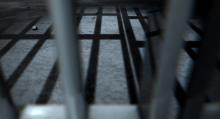
The Bureau of Prisons contacted me today, assigning me a prison number and a new address: for the next 90 days, beginning tomorrow, I’ll live at FMC Lexington, in the satellite prison camp for women, adjacent to Lexington’s federal medical center for men. Very early tomorrow morning, Buddy Bell, Cassandra Dixon, and Paco and Silver, two house guests whom we first met in protests on South Korea’s Jeju Island, will travel with me to Kentucky and deliver me to the satellite women’s prison outside the Federal Medical Center for men.
In December 2014, Judge Matt Whitworth sentenced me to three months in federal prison after Georgia Walker and I had attempted to deliver a loaf of bread and a letter to the commander of Whiteman Air Force base, asking him to stop his troops from piloting lethal drone flights over Afghanistan from within the base. Judge Whitworth allowed me more than a month to surrender myself to prison; but whether you are a soldier or a civilian, a target or an unlucky bystander, you can’t surrender to a drone.
When I was imprisoned at Lexington prison in 1988, after a federal magistrate in Missouri sentenced me to one year for planting corn on nuclear missile silo sites, other women prisoners playfully nicknamed me “Missiles.” One of my sisters reliably made me laugh today, texting me to ask if I thought the women this time would call me “Drones.”
It’s good to laugh and feel camaraderie before heading into prison. For someone like me, very nearly saturated in “white privilege” through much of this arrest, trial, and sentencing process, 90 percent (or more) of my experience will likely depend on attitude.

I am the Dean of Students at Covenant Theological Seminary, the National Seminary of the Presbyterian Church in America (PCA). I am the pastor of South City Church in Saint Louis. South City Church is a PCA congregation, and it is predominantly white. I am a retired full colonel PCA Army chaplain. I was born and raised in North Saint Louis city. My father now lives in Ferguson, Mo. I am a black man. If that comes as a shock, believe me I understand; it is a shock to me every morning when I wake up and go to work at Covenant Seminary in West Saint Louis County, a mostly wealthy and white suburb. It shocks me every time I walk into my church in South Saint Louis and remember that I am one of only 47 black pastors in my denomination and that I work in a mostly white conservative, evangelical church. I am constantly at the feet of Jesus asking for help in navigating the racial, cultural, and generational waters around me. It is a wonderful opportunity, but it is challenging for someone like me; I grew up believing that white people never really wanted to be in close proximity to black people unless they were the ones controlling the situation. There was also the belief that the only black people who were successful in white organizations were the ones who did not mind being tokens without real dignity in the system. There may be people who believe these things about me. I have even questioned myself as to why I have been given so many opportunities in the PCA. I sometimes don’t like the answers that come to mind.
Recently, a young pastor asked my opinion on cross-cultural ministry. He asked me how an African American got two positions as both Covenant’s Dean of Students and as pastor of South City Church. I explained, “it makes no sense, since so much of the history in our denomination makes me the wrong guy for the job! But through God’s sovereign will, here I am!” His response was, “I guess God always sends the wrong messenger.”

It is difficult to understand why people, particularly Christians, view a statement as patently obvious as “Black Lives Matter” as a subject for controversy. However, sometimes the most obvious things still need to be said.
So:
Black lives matter because God made every one of us in God’s image. Black lives matter because the Bible tells us that we are part of a body and the eye cannot say to the hand, “I don’t need you.” Black lives matter because God pays particular care to those crying out under the burden of injustice and oppression.
As people of faith in a neighborhood that has been rocked by protests, tear gas, and arrests, we have sought to stand in solidarity with those who are groaning under the burden of oppression. We offer some physical support — hand warmers, a cup of coffee, an extra pair of socks, but we also offer our presence. The Bible often refers to Christians as “witnesses,” and there is something important about simply standing next to our neighbors in the streets and seeing what is actually happening.
We firmly believe that Jesus needs to be down in the clouds of tear gas and he lets us, his people, participate in his reconciliation by bringing him there with our own two feet. Christians, and particularly evangelicals, need to be in the streets. Our neighbors are just outside our doors, crying out that the system is broken and that our culture doesn’t value the lives of our brothers and sisters. We, as Christians, believe in sin and brokenness and we need to live out our belief that God values all of God’s people even as our culture picks and chooses who is worth caring about.
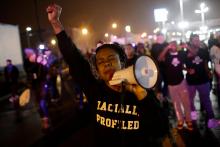
A grand jury has found that no probable cause exists to indict Darren Wilson, the Ferguson, Mo., police officer who shot and killed 18-year-old Michael Brown, on Aug. 9, said St. Louis County Prosecuting Attorney Robert P. McCulloch on Monday evening.
McCulloch said the grand jury was instructed on the law and presented on five possible indictments. He emphasized that the jurors "are the only people who have heard and examined every witness and every piece of evidence."
Protests throughout the St. Louis metro area — as well as nearly 100 cities across the country — are planned in response to the decision. Last week, Missouri Gov. Jay Nixon declared a preemptive state of emergency and activated the National Guard to respond to “any period of unrest that might occur following the grand jury’s decision concerning the investigation into the death of Michael Brown.” Rev. Traci Blackmon, a clergy leader in the St. Louis area, recently told Sojourners that while the city and county police departments have amassed weapons and riot gear to react to the protests, local community leaders and faith groups have been stocking up on bandages and first-aid materials.
Earlier in the day Brown’s family asked for 4.5 minutes of silence this evening before protests begin — a statement on the 4.5 hours Michael Brown’s body was left in a Ferguson street following the shooting.
The Justice Department is conducting its own federal investigation, however recent reports have indicated that it is not likely to result in civil rights charges against Wilson.
Stay tuned to Sojourners for continued updates and analysis.
